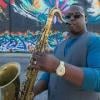
When it comes to jazz-club gigs, a rule of thumb that rarely fails me is to catch the second or third set of the evening, which are almost always more satisfying than the first. New York tenor saxophonist Wayne Escoffery confirmed this thesis once again on Thursday at Black Cat, where he made his Bay Area debut as a bandleader.
He’s no stranger to Bay Area stages. Over the past two decades, the 48-year-old Escoffery has made memorable appearances with the Mingus Big Band, trumpet great Tom Harrell, and the Black Art Jazz Collective, among other situations. But in yet another case of Black Cat serving as an essential conduit for out-of-town talent, the mid-career master finally got a chance to present his own music.

Opening his three-night residency at the Tenderloin jazz spot, Escoffery promptly stepped into the second set as if he was picking up a conversation from the first show midstream. Accelerating from zero to 60 in an instant, his superlative quartet featuring pianist Dave Kikoski, bassist Ugonna Okegwo, and drummer Marvin “Smitty” Smith tore through the title track of Escoffery’s new album Like Minds.
In a conversation last week, Kikoski described Escoffery as a formidable improviser who can “execute without any technical problems and with a beautiful sound … any idea that comes into his head.” Another original from the new album, “Sincerely Yours,” based loosely on John Coltrane’s famously treacherous harmonic steeplechase “Giant Steps” and a motif from Freddie Hubbard’s Trane tribute “Dear John,” exemplified this assessment, as Escoffery slalomed through the chord changes with aplomb and melodic cohesion.
When he wasn’t providing pot-stirring accompaniment, Kikoski may have gotten more space to solo than Escoffery throughout the set. The pianist is a powerhouse in any setting, and his ringing touch filled the intimate room.
Okegwo and Smith (who was subbing for the quartet’s regular drummer, Mark Whitfield Jr., for this California run) locked in with each other from the first beat, and it was sometimes hard not to simply marvel at Smith’s intricate trap set dance.
A brace of Wayne Shorter tunes offered a wider perspective on Escoffery. “Speak No Evil” revealed his deep affinity for Shorter’s vocabulary and tone, albeit bearing a harder edge. In any other situation, Shorter’s tender ballad “Infant Eyes” would have offered a pause in the bandstand conflagration, but the quartet kept the burner on high. The tempo dipped, but the intensity and dynamics accelerated. Smith did not touch his brushes.
The 60-minute set ended with a deliriously grooving arrangement of “Nostalgia in Times Square.” Set to an insistent backbeat, the Charles Mingus standard took on a flashy new sharkskin suit. It’s a piece that Escoffery, Kikoski, and Okegwo have played together many times in various Mingus ensembles but that the saxophonist reimagined for his own band. Leaving the club exhilarated and a little slack-jawed, I was ready to abandon my second-set guideline to return for Friday’s first show.




